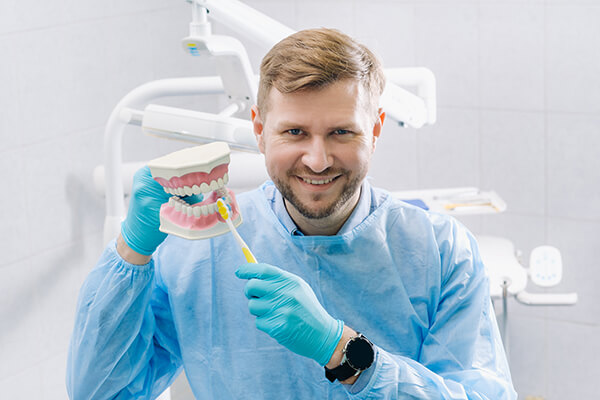Meet Your Friendly Neighborhood Dentist Eugene OR and Their Services
Meet Your Friendly Neighborhood Dentist Eugene OR and Their Services
Blog Article
An Overview to Usual Oral Conditions That Require a Dental professional's Care
Understanding the variety of oral conditions that require expert treatment is extremely important for maintaining optimum oral wellness. Toothaches, for instance, can be symptomatic of extreme concerns such as cavities, broken teeth, or abscesses, each calling for specific interventions like fillings or origin canals. Gum illness, from the very early phases of gingivitis to extra extreme periodontitis, underscores the value of routine dental examinations and cleanings. Affected wisdom teeth and jaw disorders can introduce substantial pain and problems. Making sure prompt visits to the dental practitioner can alleviate these problems effectively, but just what are the indications and therapies included?
Toothaches
Toothaches are a typical dental problem that can range from moderate discomfort to extreme discomfort, usually suggesting a hidden problem that needs specialist interest. This discomfort can come from a variety of resources, including tooth decays, cracked or fractured teeth, and oral abscesses. Each of these problems presents considerable dangers if left neglected, potentially bring about more severe issues.
Oral cavities, additionally recognized as cavities, are caused by the accumulation of plaque that wears down tooth enamel, leading to openings or pits in the affected teeth. Abscesses are agonizing infections at the root of a tooth or between a tooth and the periodontal, usually resulting from extreme decay or untreated cavities.
Efficient therapy of toothaches includes resolving the source. This might include fillings for dental caries, crowns for broken teeth, or origin canals and anti-biotics for abscesses. Early intervention by an oral specialist can avoid more wear and tear and ease pain, making sure optimal oral health and wellness.
Gum Condition
Gum disease, a prevalent yet often overlooked oral condition, manifests via swelling and infection of the gum tissues and sustaining cells. This condition primarily happens in two phases: gingivitis and periodontitis. Gingivitis, the milder kind, presents with signs and symptoms such as red, puffy gum tissues that may bleed easily during cleaning or flossing. If left unattended, gingivitis can progress to periodontitis, a more serious kind identified by the devastation of the supporting bone and connective cells, eventually causing tooth loss.
The primary source of gum tissue illness is microbial plaque, a sticky, colorless film that regularly forms on teeth. Poor dental hygiene, cigarette smoking, genetic proneness, and specific medical conditions, such as diabetic issues, can intensify the danger of establishing periodontal disease. Regular dental exams are essential for very early detection and management of this problem.
Therapy for gum tissue illness ranges from professional oral cleaning and scaling to advanced procedures like origin planing and periodontal surgical treatment, depending on the severity. Maintaining excellent oral hygiene techniques, including cleaning two times daily, flossing, and using an antiseptic mouthwash, can dramatically reduce the risk of gum tissue condition and promote healthier gum tissues.
Tooth Cavities
Dental caries, likewise referred to as tooth decays, are an usual dental problem characterized by the destruction of tooth enamel because of acid-producing germs in the mouth. These bacteria thrive on sugars and starches from food and drinks, producing acids that slowly wear down the enamel, causing dental caries formation.
Early-stage dental caries may not reveal signs, however as they progress, they can create tooth pain, level of sensitivity to warm or cold, noticeable openings or pits in the teeth, and staining. If left unattended, cavities can pass through much deeper layers of the tooth, possibly resulting in severe discomfort, infection, and also tooth loss.
Avoiding dental caries involves a combination of good dental health techniques and dietary habits. Regular brushing with fluoride tooth paste, flossing, and routine dental examinations are important. Dental experts might additionally suggest additional safety nets, such as fluoride treatments and dental sealants, to shield teeth from degeneration.
Treatment for dental caries depends upon their seriousness. Minor cavities can be resolved with dental fillings, which bring back the tooth's framework. If the degeneration has actually reached the tooth's pulp, extra advanced cases may require crowns or also root canal therapy. Timely intervention by a dentist is necessary to prevent complications and preserve total dental health and wellness.

Impacted Wisdom Teeth
Influenced wisdom teeth are a prevalent dental issue that happens when the third molars, frequently referred to as wisdom teeth, stop working to totally emerge or align properly within the mouth. This problem typically arises from inadequate space in the jaw or an uncommon development angle of the teeth. Impacted wisdom teeth can bring about a range of difficulties, consisting of pain, infection, and damage click over here to nearby teeth.
When knowledge teeth come to be influenced, they are frequently partly appeared or continue to be totally beneath the gum line. This partial eruption can produce a pathway for germs to go into the gum tissues, leading to infections that manifest as swelling, discomfort, and also high temperature. Furthermore, influenced knowledge teeth can apply stress on surrounding teeth, potentially triggering crowding or moving.
An extensive oral exam, commonly including X-rays, is important for diagnosing influenced knowledge teeth. Regular oral check-ups are advisable to monitor the problem and maintain dental health.
Jaw Disorders
Jaw conditions, collectively understood as temporomandibular joint (TMJ) disorders, encompass an array of conditions that influence the jaw joint and bordering muscles. These conditions can manifest with signs such as discomfort or tenderness in the jaw, problem chewing, a clicking or standing out noise when opening up or closing the mouth, and also chronic headaches. TMJ problems can occur from different variables, consisting of joint inflammation, jaw injury, or habitual actions like teeth grinding or jaw clenching.
Medical diagnosis of TMJ problems generally includes an extensive analysis by a dental professional, including a physical evaluation of the jaw, oral X-rays, and sometimes advanced imaging techniques like MRI or CT checks to analyze the joint's condition. Non-invasive techniques such as physical treatment, oral splints, and medications aimed at minimizing inflammation and pain are frequently first-line therapies.
Very early intervention by a dental specialist is important to stop the progression of TMJ conditions and to preserve overall oral wellness. People experiencing consistent jaw pain or disorder need to look for timely assessment and therapy.
Verdict
Toothaches often suggest underlying concerns such as cavities, cracked teeth, or abscesses, calling for prompt intervention. Affected wisdom teeth and jaw problems also need specialist interest to reduce discomfort and prevent further complications.
Oral cavities, likewise understood as decays, are caused by the accumulation of plaque that deteriorates tooth enamel, leading to openings or pits in hop over to these guys the affected teeth. Abscesses are painful infections at the origin of a tooth or in between a tooth and the gum, typically resulting from serious degeneration or unattended cavities.

Additionally, influenced wisdom teeth can put in pressure on bordering teeth, potentially creating crowding or shifting.
Report this page